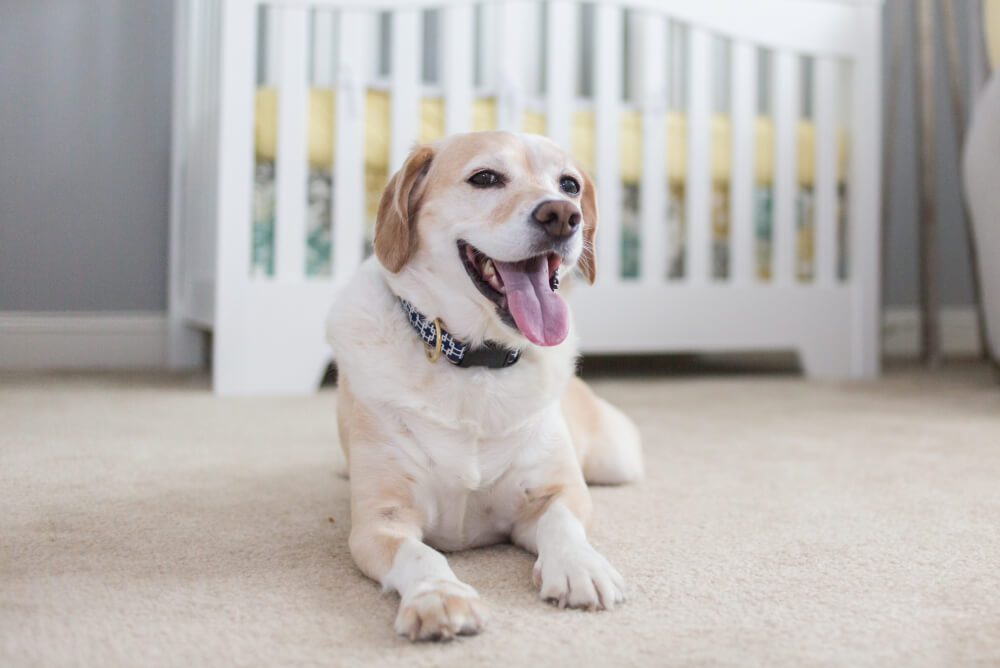
DogFoodAdvisor is reader supported See how
All reviews are 100% impartial but if you buy using links on this page, we may earn a referral fee.
What’s the best dog food for pregnant dogs?
During pregnancy, it is crucial to provide a pregnant dog with a balanced and nutritious diet to support her own health and the development of her puppies.
A pregnant dog’s energy requirements increase as the pregnancy progresses. Select a dog food that is specially designed to meet these increased calorie needs without sacrificing nutritional balance.
Protein is essential for the growth and development of the puppies and for the overall health of the pregnant dog. Ensure that the dog food you choose has an adequate amount of high-quality protein sources, such as chicken, beef, or fish.
Look for a dog food that contains essential nutrients like omega-3 fatty acids (found in fish oil or flaxseed) to support brain development in the puppies, as well as vitamins and minerals for overall health and immunity.
Pregnant dogs may experience digestive sensitivity, so choose a dog food that is easily digestible. Opt for formulas that contain high-quality ingredients and avoid excessive fillers or artificial additives that could cause digestive upset.
In fact, swapping to a recipe formulated specifically for puppies can be beneficial for pregnant dogs, as these tend to be higher in protein and contain more omega-3 fatty acids then regular dog food.
Each pregnant dog is unique, and their nutritional needs can vary. Consult with your veterinarian to determine the specific dietary requirements for your dog’s stage of pregnancy and any underlying health considerations.
Below you can find a list of our recommendations of the best foods for pregnant dogs. You’ll also learn the answer to each of the most frequently asked questions we get about pregnant dogs.
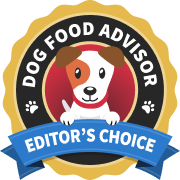
Best Dog Food for Pregnant Dogs May 2024
Here are The Dog Food Advisor's best dog food brands for pregnant dogs for May 2024.
-
1. Ollie
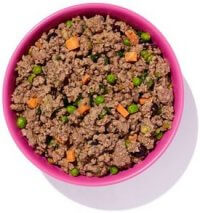
Fresh Beef With Sweet Potatoes is one of 5 fresh recipes included in our review of the Ollie Fresh product line.Beef, carrots, beef kidneys, potatoes, peas
Ollie Fresh Beef with Sweet Potatoes derives the bulk of its meat protein from beef. Dry matter label analysis reveals the recipe contains 32.1% protein, 25% fat and 34.9% estimated carbs… resulting in a fat-to-protein ratio of about 78%.
Read our review of the full Ollie Dog Food (Fresh) range here
Main Ingredients Beef, carrots, beef kidneys, potatoes, peas Type Grain-free, fresh Protein Percentage 32.1 AAFCO Standards All Life Stages Best For Puppies and Dogs Sample buyer review...
Read more buyer reviews at MyOllie.com"Absolutely love and adore this food we added to all of our pregnant and nursing mama's food!"
-
2. Nutrish
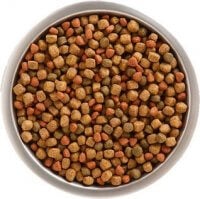
Nutrish Bright Puppy is one of 8 dry recipes included in our review of the Rachael Ray Nutrish product line.
Rachael Ray Nutrish Bright Puppy derives the bulk of its meat protein from chicken. Dry matter label analysis reveals the recipe contains 31.1% protein, 17.8% fat and 43.1% estimated carbs… resulting in a fat-to-protein ratio of about 57%.
Read our review of the full Rachael Ray Dog Food range here
Main Ingredients Chicken, chicken meal, brown rice, soybean meal, whole corn Texture Dry Type Grain-inclusive Protein Percentage 31.1 AAFCO Standards All Life Stages Best For Puppies and Dogs Sample buyer review...
Read more buyer reviews at Nutrish.com"So far I have fed this to the puppies' mamma. Working well!"
-
3. Diamond

Diamond Naturals Large Breed Puppy Lamb And Rice is one of 13 dry recipes included in our review of the Diamond Naturals product line.
This large breed puppy food derives the bulk of its meat protein from lamb. Dry matter label analysis reveals the recipe contains 30% protein, 16.7% fat and 45.3% estimated carbs… resulting in a fat-to-protein ratio of about 56%.
Read our review of the full Diamond Naturals Dog Food (Dry) range here
Main Ingredients Lamb, lamb meal, whole grain brown rice, cracked pearled barley, grain sorghum Texture Dry Type Grain-inclusive Protein Percentage 30 AAFCO Standards All Life Stages Best For Puppies and Dogs Sample buyer review...
Read more buyer reviews at DiamondPet.com"I was introduced to Diamond Naturals back in 2010, when we got our first English Mastiff. Two English Mastiffs, one Great Dane, one Daniff, and three litters of Daniffs later STILL using Diamond Naturals Large Breed Puppy Lamb & Rice for ALL puppies, and introducing to new parents of puppies. LOVE Diamond Naturals!!"
-
4. The Honest Kitchen
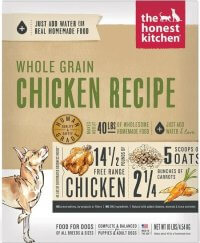
Whole Grain Chicken Recipe is one of 8 dehydrated recipes included in our review of the The Honest Kitchen Whole Grain product line.
The Honest Kitchen Whole Grain Chicken Recipe derives the bulk of its meat protein from chicken. Dry matter label analysis reveals the recipe contains 26.6% protein, 15.2% fat and 50.2% estimated carbs… resulting in a fat-to-protein ratio of about 57%.
Read our review of the full Honest Kitchen Dog Food (Dehydrated) range here
Main Ingredients Dehydrated chicken, organic barley, dehydrated potatoes, organic flaxseed, organic oats Type Grain-inclusive Protein Percentage 26.6 AAFCO Standards All Life Stages Best For Puppies and Dogs Sample buyer review...
Read more buyer reviews at TheHonestKitchen.com"I have mothering dogs and I feed them this everyday. It is healthy for them and provides enough nutrition after birth."
-
5. Instinct
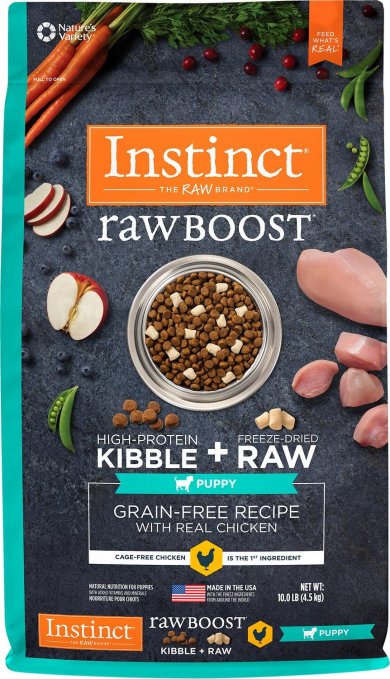
Raw Boost Puppy Grain-Free Recipe With Real Chicken & Freeze-Dried Raw Pieces is one of 12 dry recipes included in our review of the Raw Boost product line.
Instinct Raw Boost Puppy Grain-Free Recipe With Real Chicken & Freeze-Dried Raw Pieces derives the bulk of its meat protein from chicken. Dry matter label analysis reveals the recipe contains 39.6% protein, 23.6% fat and 28.8% estimated carbs… resulting in a fat-to-protein ratio of about 60%.
Read our review of the full Instinct Raw Boost Dog Food (Dry) range here
Main Ingredients Chicken, turkey meal, peas, menhaden fish meal, egg product Texture Dry Type Grain-free Protein Percentage 39.6 AAFCO Standards Growth and Reproduction Best For Puppies and pregnant or lactating females Sample buyer review...
Read more buyer reviews at InstinctPetFood.com"Great for my pre-natal mom dog - vet recommended to me and she loves it!."
More Top Picks
To view more top dog foods by category… click the link below that best meets your personal feeding needs.
Frequently Asked Questions
What should I feed my pregnant dog?
A pregnant dog requires a balanced and nutritious diet to support her health and the growth of her puppies. She will need more calories as her body uses more energy during pregnancy, but the food should still be nutritional.
The best dog food for a pregnant dog will contain essential nutrients such as omega-3 fatty acids to help the puppies’ brain development, plus vitamins and minerals. It should also have high-quality ingredients and protein sources like beef, fish, or chicken.
Some pregnant dogs might experience sensitive stomachs, so an easily-digestible dog food with limited fillers and artificial additives can help with this.
You should seek advice from your vet if you are unsure what to feed your pregnant dog, particularly if your dog has existing medical conditions, as each dog has different requirements.
Should I feed my pregnant dog puppy food?
Yes, from week six of pregnancy your pregnant dog should be given high-quality puppy food or a puppy formula. You will need to slowly transition them onto this food, over the course of five days to a week, to avoid an upset stomach.
Puppy food is higher in protein, energy, and vitamins and minerals which are essential for puppy development, compared to adult food. Giving your pregnant dog puppy food at this stage is crucial for providing them with extra nutrients as their stomach size reduces and their appetite shrinks. The food should also be easy to digest.
Consult your vet if you need help with choosing a puppy food, and consider your dog’s breed and size — make sure you are giving small breed puppy food to a small breed, for example.
How many times a day should a pregnant dog eat?
Pregnant dogs will need more food than normal but they will also have less space in their stomach. Once you have moved your pregnant dog onto puppy food, you should also start to increase their meal times.
To accommodate for a smaller stomach, feed your pregnant dog little and often, rather than two large meals a day.
Should I increase my pregnant dog’s food?
Yes, but not straight away. For the first five weeks of pregnancy, dogs won’t need to increase their food intake. They may even experience nausea or a reduced appetite, similar to our morning sickness symptoms. However, between six and seven weeks of their pregnancy, dogs should be given 25% more food to account for their weight gain and milk production.
In week nine of pregnancy, your dog might lose their appetite, which often means the puppies are close to arrival.
Do pregnant dogs need lots of water?
Yes, fluid intake is important for pregnant dogs who are sharing food and nutrients with their growing puppies. Your dog may experience increased thirst so you should always ensure fresh water is available for them at all times.
Can I give milk to my pregnant dog?
Yes, milk is a great source of nutrients for a pregnant dog.
What are the signs that my dog is pregnant?
The signs to look out for if you think your dog might be pregnant are:
- Swollen stomach
- Increased appetite
- Reduced appetite or vomiting
- Fatigue
- Weight gain
- Increased nipple size
- Nesting behavior
- Irritable
- Showing more affection









